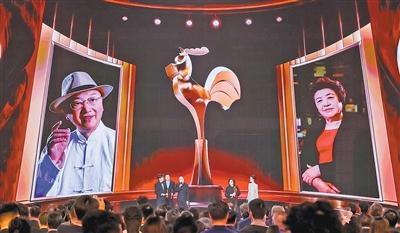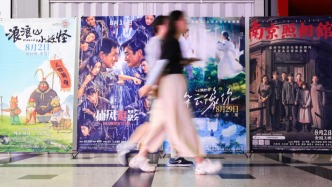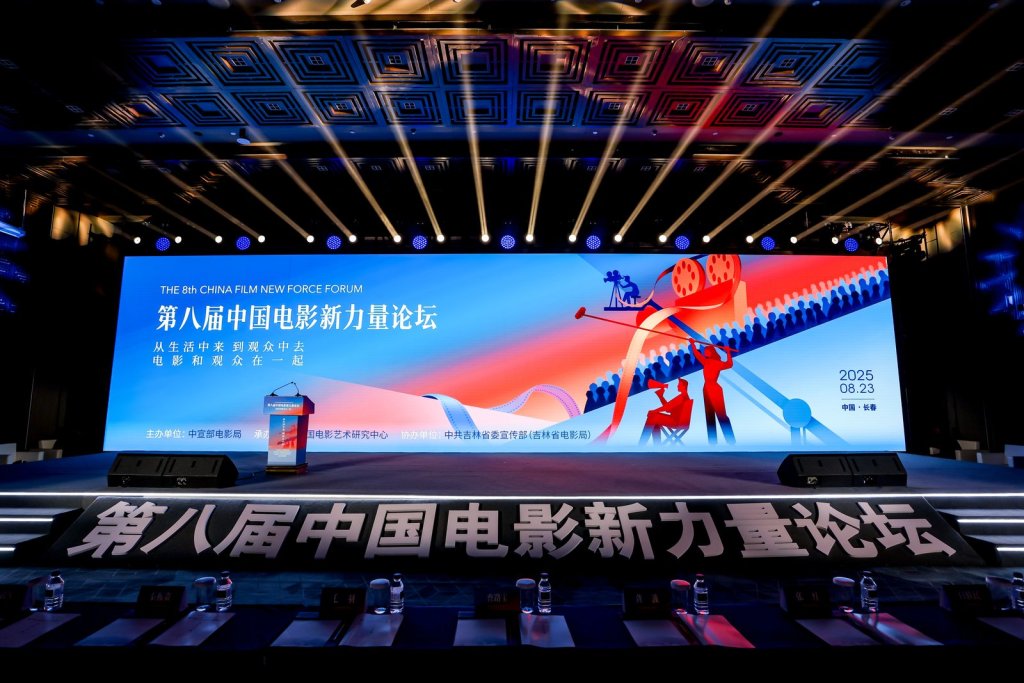

The 38th Golden Rooster Awards ceremony was held, where 83-year-old first-class actor Qiao Zhen and 84-year-old first-class director Xiao Guiyun (right) were awarded the Lifetime Achievement Award (Film) by the China Federation of Literary and Art Circles. (Photo provided by China Film Association)
The 120-year history of Chinese cinema is a grand narrative closely intertwined with the nation's future and the destiny of its people. Generations of filmmakers have consciously integrated their creative work into the tide of national development, using images to "portrait the times, chronicle the times, and illuminate the virtues of the times." By solidifying script details, vividly depicting characters' fates, and creating an authentic historical atmosphere, we have deeply rooted the "roots" of art in the fertile soil of national culture and forged the "soul" of films into the needs of the times, thus giving our works vitality and impact.
Looking back on my creative journey with Li Qiankuan, from rural-themed films like "The Fields Are Green Again" to children's films like "Xinghai," from opera films like "Bao Gong Apologizes" to industrial-themed films like "Dream of the Century," from films reflecting the reform of Kuomintang war criminals like "After the Decisive Battle" to major historical films like "The Chongqing Negotiations," "The July 7th Incident," and "The Founding Ceremony of the People's Republic of China"... whether focusing on real life or recreating historical events, we have always adhered to one creative philosophy: the "roots" of film are the rich soil of the national culture and people's lives that gave us birth and nurtured us; the "soul" of film is the national spirit and the spirit of the times shown through the art of light and shadow.
Filming "The Founding Ceremony of the People's Republic of China" was like climbing a high mountain. Upon reading the script, a strong creative impulse and a firm determination to make a good film surged within me almost simultaneously. Filming began on location at the Yinian Hall in Zhongnanhai, lasting six months and covering 12 provinces and cities across the country. We employed 150,000 extras and recruited 138 actors. But we remained passionate and undaunted, turning the impossible into possible and maximizing our potential. This was an accumulation of genuine emotion, a confidence instilled in us by the grandeur of history. To make a good film, creators must have a strong creative impulse and abundant passion for the subject matter. When the subject matter you are working on is intertwined with the fate of your nation and country, how can your emotions and thoughts be detached from your nation and country?
A masterpiece must be an organic unity of profound thought and sincere emotion. A director without thought can never become an artist. When filming "The Chongqing Negotiations," we not only had to accurately grasp the historical context and essence of that period—its "reason"—but also poured our hearts into presenting the complex inner world and emotional turmoil of historical figures at specific historical junctures—its "emotion." Chongqing is a mountain city, and its old buildings are characterized by black-tiled roofs. We seized upon these characteristics, appropriately adding white doves flying over the rooftops of these black-tiled houses at key moments throughout the film, symbolizing people's yearning for and call for peace, thus imbuing it with poetic beauty. Drawing nourishment from the vibrant reality and profound history, the work possesses both theoretical strength and is filled with the warmth of life and humanistic care, highlighting the charm of art.
Having traversed 120 years of trials and tribulations, Chinese cinema has accumulated a profound and excellent tradition and invaluable creative experience. Tradition is the cornerstone and source of our innovation; we work on the shoulders of our predecessors. With reverence, we must uphold the original aspiration of filmmaking for the people, maintain a relentless pursuit of artistic excellence, and safeguard the aesthetic spirit of our national culture. The vitality of film art lies in innovation, and the prerequisite for innovation is adherence to principles. The more significant the historical subject matter, the more artistic merit it must possess. Respecting historical facts, ensuring "major events are accurate, minor details are flexible," creating vivid characters, touching details, and originality—only then can historical stories shine with new brilliance on the screen, attracting and moving audiences.
While the characters in "After the Decisive Battle" can certainly be found in the reportage "The General's Decisive Battle Was Not Just on the Battlefield," we still consulted archives and interviewed the director of the war criminal management center in Beijing, ultimately deciding to focus on presenting Du Yuming's "heartfelt acceptance" in the film. In the film, the director tells Du Yuming that the materials he wrote were incomplete. Du Yuming firmly says, "I've told you everything, everything that needs to be said, nothing is omitted." The director says, "You didn't mention the Battle of Kunlun Pass. History is incomplete without any aspect." The Battle of Kunlun Pass was a very influential siege battle in the War of Resistance Against Japan, and due to its proper command, it achieved the first major victory for the Chinese army against the Japanese army in siege warfare. This statement acknowledges Du Yuming's achievements and touches his heart; this treatment reflects the breadth of mind and brilliance of the Chinese Communists. Every time I see this scene, I am deeply moved.
Standing at this historical juncture of the 120th anniversary of Chinese cinema, we look back with deep affection on our glorious journey and look forward with confidence to the future. The path of filmmaking has never been smooth; it has been filled with challenges and hardships, but also with the joy of creation and the value of dedication. Our generation has witnessed and participated in the development of Chinese cinema, and the future of Chinese cinema rests on the shoulders of its young people. We hope that young people will cherish this great era, boldly utilize their wisdom and talent, use film to write new stories of China in this new era, and hold the torch of national spirit even higher, passing it on to a brighter future.


